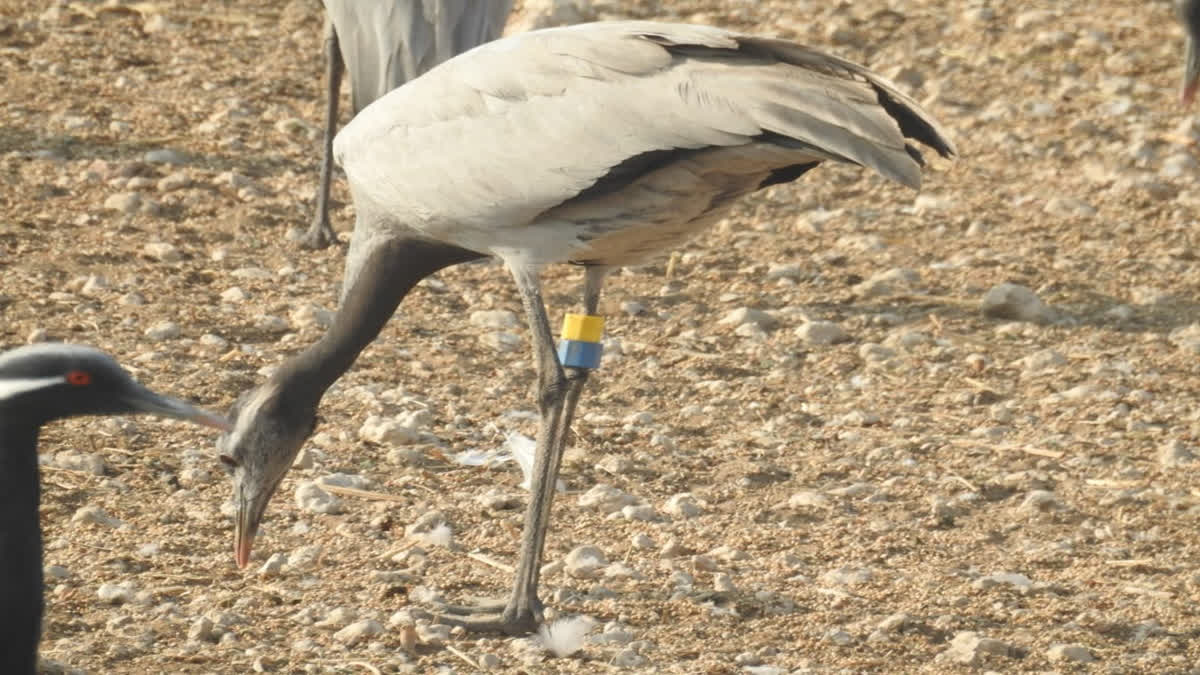Jodhpur: Setting out on a journey of thousands of kilometers, the Kurjan cranes of Siberia migrate to Rajasthan’s wetland areas every year just before the onset of winter. However, things are not as pleasant this time as they used to be.
Over half a dozen migratory Demoiselle Cranes, locally popular as Kurjan birds, have died in Phalodi area in just five days between December 15 and 19, even as the forest officials are scaling up rescue measures. While initially it was suspected that death of these exotic birds was due to food poisoning, latest reports suggest they died of avian influenza, commonly known as bird flu.
According to lab reports, the viscera samples collected from dead Kurjans detected bird flu virus H5N1. However, the virus is said to have been detected in one sample. In such a situation, the possibility of the spread of virus is very low. It is also a matter of relief that the transmission of this virus to humans has never been found in Rajasthan.
Meanwhile, Phalodi District Collector Harji Lal Atal held a meeting on Friday and directed the officials concerned to remain on alert mode.
Dr Dau Lal Bohra, a member of the International Union for Conservation of Nature, said that seven demoiselle cranes 'Kurjan' have died in Phalodi's Khichan. "The samples were tested in a lab in Bhopal. During examination, Kurzan's death has been suspected to be caused by bird flu virus H5N1. A detailed report in this regard has been sent to the Collector," Dr Bohra said.
On Thursday, another Kurjan died after coming in contact with a live electric wire in the region. Bird-watcher Sevaram Mali said that the villagers were alert enough to rescue the injured Kurjan and take it to the nearby forest department, but it could not be saved.
Phalodi Assistant Conservator of Forest (ACF) Krishna Kumar Vyas stated “The forest department team is on alert mode. General public and tourists have been asked to avoid any kind of contact with Kurzan. They have been barred from going closer to bird sites. No bird has died in the last two days. Monitoring is being done at every level.”
Seven Kurzans Died In Khichan In Five Days
This sudden spike in Kurjan deaths was initially believed to be due to consumption of food containing pesticides, but the department sent the viscera of the dead birds to Bhopal for examination. Initial reports suggest bird flu virus, although reports of some birds are yet to come. At present, all kinds of arrangements have been made at the rescue center.
Dr. Dau Lal said that a similar instance of bird flu outbreak was reported in Kaparda near Jodhpur in 2021, but forest administration had swung into action and managed to contain the spread. He has said that bird-to-human transmission of this virus has never been found in Rajasthan.
Kurjans Flew 3676km To Reach Khichan
Every year, during the winter, thousands of Kurjans arrive at Phalodi’s Khichan and fly back to Siberia after around 5-6 months of stay. Bird watcher Sevaram Mali said that Kurjans, who for decades have been flocking to Khichan via Nepal, entered the borders of India via Jaisalmer from Pakistan this year, which usually is their return route. And the reason he cited for this unusual change in behaviour could be the Russia-Ukraine war.
One of the tagged cranes, named Sukpak, flew over 3500 kms to reach Khichan of Rajasthan. Sukpak entered India from the Jaisalmer border after flying through Russia, Kazakhstan, Turkistan, Afghanistan and Pakistan. The exact distance (3676km) the migratory bird covered is reportedly the longest recorded flight ever for a crane flying to Rajasthan.
Also Read



